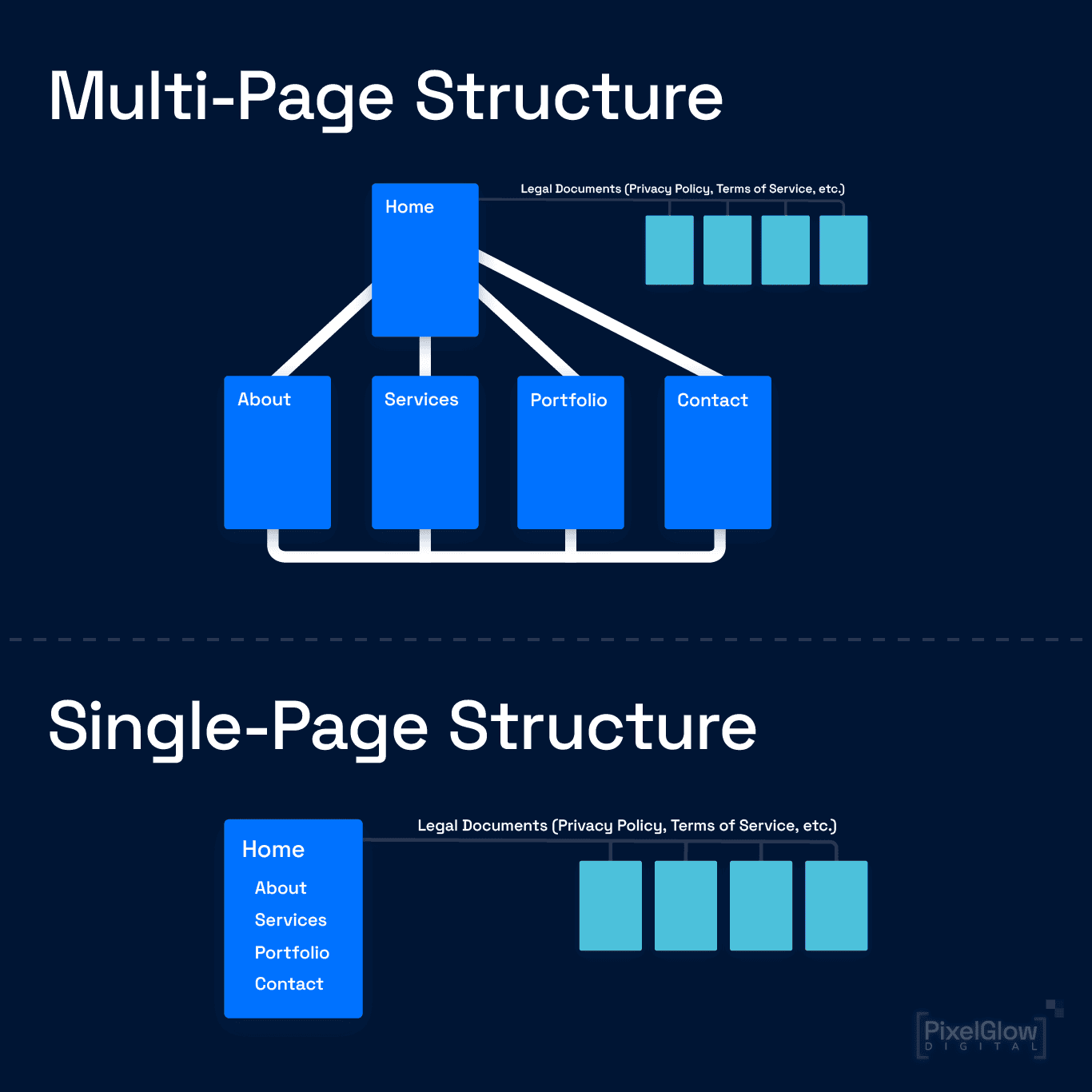Businesses that need a quick way to get their websites online often opt for a Single-Page site. What is this type of website? Is it worth using? We will explore these questions in this quick article.
What is a Single-Page Website?
Well, it’s in the name!
Single-page sites, often referred to as ‘One Pagers’, describe a structure of website where all of the main content is contained on the homepage of the site. This excludes other required pages and legal documents such as your Privacy Policy, Terms of Service, etc.
One Pagers are typically scroll-heavy, lacking navigational menus, and, when built correctly, heavily geared towards creating a very direct user experience and sales pitch.
Here is a visual representation of an example website and how it could be built and linked in a more traditional Multi-Page and aforementioned Single-Page Structures:

Although simplicity is rarely a bad thing, don’t be fooled into thinking that One Pagers are suitable for every use case. Let’s explore the Advantages and Disadvantages of this type of website to help you decide whether a Single-Page site is worth considering for your business needs.
Single-Page Website Advantages
Lower Prices- These websites are often quick to build which leads to lower average design and maintenance costs.
Focused Websites- Built properly, a One Pager will offer a sharp, to-the-point experience that tells your visitors all about who you are and what you offer. Single-Page sites easily allow you to create and control a lean page narrative that is destined to perform well.
Higher Conversion Rates- Well built single-page sites often return a higher conversion rate than their multi-page counterparts, provided your content is correctly focused on funnelling users.
Single-Page Website Disadvantages
Poor Navigation- Navigation is often very minimal or non-existent which can prove frustrating to your visitors.
Loading Speeds- With Single-Page site structures, you are essentially cramming what could justify 3-5 pages worth of content into one page; for example- a homepage, about page, services page, portfolio page, and a contact page.
Naturally, all this information on a single page is going to make your website load slowly. Slower loading times will increase user frustration which may lead to page abandons. Therefore, speed optimisation through correctly sized images, compression, and other means is crucial for an effective Single-Page design.
Low On-Page Content– You will have to be prepared to sacrifice some content to make everything effectively fit onto your new One Pager without overloading your visitors with information!
Tricky Search Engine Optimisation (SEO)- Your website’s SEO can take a hit due to some of the reasons mentioned above; slow loading speeds, low on-page content and little to no page interlinking.
Furthermore, accurate analysis of SEO efforts can be somewhat tricky and may require some premium analysis tools.
Low Scalability- You are limited with how much you can feasibly put on one page before you damage your page loading speeds and/or user experience. Should you feel the need to add more relevant content or functionalities to your website after launch, you might find that your Single-Page design becomes too limiting for your current needs.
However, if you choose to expand your website at a later date, a properly constructed single-page site can serve as an excellent design boilerplate to efficiently build new pages for a more traditional multi-page website structure.
Wrapping up…
As you can see from the advantages and disadvantages above, One Pagers are something of a double-edged sword. What you gain in one aspect you may find you lose elsewhere.
One Pagers may be worth considering if any of these points apply;
- You need to get a modern brand-focused site online quickly and cheaply
- You are predominantly service or quote based without the need for lots of additional separate product pages
- You offer bespoke products or services that rely on customer enquiries
- You need a slick, user experience that will net you a high conversion rate
However, if any of the following points describe your needs, you might want to consider a more traditional multi-page website structure;
- You are planning on implementing content strategies such as blogging or article writing
- SEO strategies will form the main core of your marketing strategy and will be crucial to your success
- Your business has an extensive catalogue of products or service information that requires detailed information
- You have a lot of information that needs to go on your website
If you have any doubts about a page structure that will work well for your web needs, please do not hesitate to get in touch.
